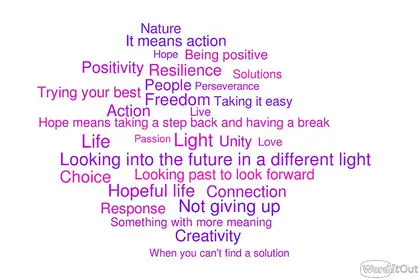
He Kaupapa Tūmanako/Project Hope was launched in 2020.
What gives you hope? That is the question He Kaupapa Tūmanako/Project Hope, a course developed by Massey sociologists, has been asking secondary school students.
He Kaupapa Tūmanako/Project Hope asks, “What does hope look like in a Covid world?” to harness the voices and aspirations of young people in ways that develop their leadership skills and a hopeful vision of their future.
Dr Alice Beban is one of the course teachers, and says it is a particularly important project, “as young New Zealanders are feeling increasingly hopeless about the prospects of growing up in a world transformed by climate change, Covid, and inequality.”
The course was launched in 2020 and has been developed and taught by Dr Beban, Dr Warwick Tie, Nicolette Trueman and Dr Matt Wynyard from the Sociology programme in the School of People, Environment and Planning.
Around 100 secondary school students from schools in Auckland, Manawatū and Iceland participated in the first two courses. The third iteration of the course (which is online) is launching in August 2021 and will involve students from Long Bay College in Auckland, Palmerston North Girls’ High School and Suzhou High School in China.
About He Kaupapa Tūmanako/Project Hope
Staff across the College of Humanities and Social Sciences contributed to the course, including Associate Professor Krushil Watene, Ngāti Manu, Te Hikutu, Ngāti Whātua o Orākei, Tonga (Māori philosopher), Dr Carolyn Morris (social anthropologist), Dr April Bennett, Tūwharetoa, Waikato, Tūhoe, Ngāti Raukawa ki te Tonga, (Māori planner), Associate Professor Elspeth Tilley (playwright), Thomas Nash (peace campaigner), and Dr Shine Choi (politics scholar).
“We also worked with Dr Bennett to design a course with a Mātauranga Māori approach to hope, centred on the connections between individuals, their communities and their wider environment,” Dr Beban says.
The course has three modules - thought/whakaaro, relationships/whiti, action/ātetenga.
“These engage students in individual and group exercises, enabling them to build connections with individuals, communities and the environment. In each module, students watch the guest presentations then practice hope themselves through reflective individual exercises that lead to collaborative group work,” Dr Beban says.
Positive student feedback
One hundred percent of students’ survey responses showed that students had a positive experience in the course.
Participants’ said: “I learnt more about myself and my past and it got me to reflect on what is important in today’s world”; “I feel more involved in my thinking and the things around me”; “The course is very inspirational and motivational”.
And another said: “The pandemic and especially lockdown in New Zealand made everyone feel quite scared and alone. I'm really glad this project exists. I truly think that this is a great course for young people who are in the process of maturing and developing strong character”.
Latest developments
The Massey Foundation has provided funding to continue expanding the course to new audiences. “The first course was face-to-face but the third one is completely online. It’s an opportunity to innovate in digital teaching and reach out to new audiences,” Dr Beban says.
“In this latest iteration we will be involving student mentors for the first time. These are high school students who have done the course before and are now receiving training to develop skills in group facilitation and leadership. We are also putting together a professional development version of He Kaupapa Tūmanako that will be available to teachers.”